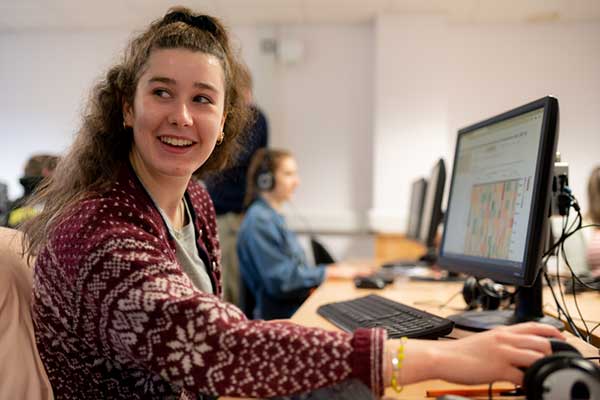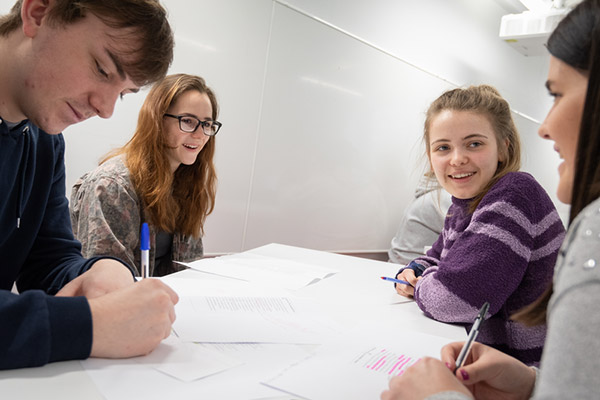View semester dates

BA (Hons) English Language and Linguistics
Discover the changing shape of English over time and space. Explore the science behind language acquisition, processing and communication.
Year of entry: 2026/27
View semester dates
8th in the UK for graduate prospects in linguistics
1st in the UK for the quality of our linguistics research
9th in the UK and world top 100 for linguistics
Why study English language and linguistics at York?
Engage with language theory and analyse linguistic data. Follow your own academic interests and combine theory and practice to tackle unique problems. You'll develop a deep understanding of how language works.
Study under leading researchers. You'll be taught by passionate academics, whose expertise covers many areas of linguistics. In your second and third years, you’ll be able to choose from the extensive range of option modules they offer.
Develop skills for a range of careers. The critical skills you’ll develop could lead into a range of careers, such as teaching, speech and language therapy or marketing. You could integrate an industry placement or study abroad and we have a dedicated careers officer to support you when you need it.
Explore specialist labs and facilities. Depending on the modules you choose, you’ll learn in dedicated spaces, including our e-lab. We’re also home to a premium multilingual interpreting and translation suite.
Get a head start in Teaching English as a Foreign Language at York
At York, you'll benefit from being able to take TEFL modules in-house, as part of your degree. The work you complete in your TEFL modules can help you prepare for a qualification. This teacher training programme, also offered in-house, can qualify you to teach English to non-native speakers.

Why did I choose York? A great many reasons! It’s amongst the best for linguistics in the UK, and the diverse course appealed to me. I also love the city and a visit to the beautiful campus sealed the deal!
Course content
You’ll examine spoken and written data to understand how language works, using tools from core areas of linguistics including syntax, phonetics and phonology, sociolinguistics and semantics. You will apply your knowledge and skills in linguistics to different domains of language study, for example: psycholinguistics, language acquisition, language variation and change, language in interaction, the history of English, forensic linguistics, forensic speech science, and teaching English as a foreign language.
Building upon the core skills in linguistic analysis you developed in your first year of study, you can customise your programme of study by specialising in particular areas of interest in your second and final years.
You'll be able to take elective modules from another department. All electives are offered subject to departmental approval and timetable availability. You may also take certain language courses offered by Languages for All (LFA) as electives, but there may be restrictions on which LFA levels can be taken at each stage of your degree. Ask us for further details.
Year 1
You will gain a grounding in the basic vocabulary and concepts of linguistic theory, which form the bedrock of your future study of the English language. We also put the modern language in context by exploring where it came from and why it is the way it is today. Throughout the year, you will learn core skills in linguistics that complement your English Language studies.
Core modules
- Understanding Language in the Real World
- Language and the Mind
- Structure of English
- Syntactic Structures
- Phonetics and Phonology
- English Past and Present
Academic integrity module
In addition to the above you will also need to complete our online Academic Integrity module.
Year 2
In the second year, you'll apply your core analytic knowledge to new types of data in English Language and Linguistics, according to your interests (eg regional varieties of English, Teaching English as a Foreign Language, historical development of English). You'll also continue to deepen your theoretical knowledge in the core areas of linguistics that you choose to pursue. Second-year linguistics modules cover areas including phonetics and phonology, language variation and change, syntax, semantics, interaction, and psycholinguistics.
Core modules
- At least one of: Aspects of a Theory of Syntax, Acoustic Phonetics and Phonological Analysis or Sociolinguistics
- Foundations of Meaning
Option modules
You will study four option modules. Examples can be found below. Some option module combinations may not be possible. The options available to you will be confirmed after you begin your course.
- Middle English: Texts and Contexts
- Language Attitudes in Applied Contexts
- Teaching English as a Foreign Language I
- Teaching English as a Foreign Language II
- Language of Turn and Sequence
- Linguistics as Data Science
- Language Acquisition
Elective modules
You may be able to replace one option module with an elective module, studying a complementary subject, a language or an interdisciplinary topic.
Year 3
In your final year, you can choose freely from a wide range of modules. You will have the opportunity to become proficient in all aspects of managing small-scale linguistic projects, from identifying the research questions, to communicating the findings. You can choose to specialise, follow your own interests and carry out original research.
You will study six option modules. Examples can be found below. Some option module combinations may not be possible. The options available to you will be confirmed after you begin your course.
- Forensic Phonetics
- Multimodality: Language and the Body
- TEFL II
- Linguistic Computations: Real and Artificial Intelligence
- Topics in Language Variation and Change
- Dialect Grammar of British English
- English Corpus Linguistics
- Forensic Linguistics
- English Place-names Across Time and Space
- Bilingualism
- Psycholinguistics: Language Processing
- A Usage-based View of Language
- Topics in Phonetics & Phonology
- Topics in Psycholinguistics: Language Processing
- Topics in Syntax
- Neurolinguistics: Language & the Brain
- Phonological Development
- Linguistic Approaches to Second Language Acquisition
Elective modules
You may be able to replace one option module with an elective module, studying a complementary subject, a language or an interdisciplinary topic.
Our modules may change to reflect the latest academic thinking and expertise of our staff, and in line with Department/School academic planning.
Learning outcomes
Every course at York has been designed to provide clear and ambitious learning outcomes. These learning outcomes give you an understanding of what you will be able to do at the end of the course. We develop each course by designing modules that grow your abilities towards the learning outcomes and help you to explain what you can offer to employers. Find out more about our approach to teaching and learning.
Learning outcomes for this course
- Apply a thorough and scientifically grounded understanding of the English language in a variety of contexts, including writing, teaching, and solving complex communication-related problems.
- Approach with confidence intricate, complex and unfamiliar linguistic phenomena, discern relevant patterns and convey their significance to a variety of audiences.
- Propose creative and principled solutions to linguistic problems and contribute them effectively to interdisciplinary teams, forming a bridge between humanities and scientific disciplines.
- Communicate clearly and effectively to specialists and the general public, using advanced written and oral skills, the nature and relevance of linguistic questions and controversies, the pivotal significance of language for human cognition, and the ways knowledge of language influences behaviour.
- Appreciate, engage with, and synthesise arguments from a variety of standpoints, and interrogate their own assumptions, showing clear reasoning and an understanding of linguistic and cultural diversity.
- Identify and formulate novel questions and projects and work effectively on them taking on different roles in a range of work environments.
- Engage with aspects of social, cultural, and political realities where language plays an important role with sensitivity and perceptiveness, and be able to highlight the relevance of linguistic issues to policy-making in a globalised and interconnected world, and especially the role of the English language in a global language community.
Fees and funding
The fees and funding information here is for students starting in the 2026/27 academic year.
If you take a year abroad or year in industry you'll pay a reduced rate of fees for that year.
Annual tuition fees
| UK (home) | International and EU |
|---|---|
| £9,535 (TBC) | £26,900 |
The UK government has announced its intention to increase tuition fees from £9,535 to £9,790 for the 2026/27 academic year. We expect this to apply to new UK (home) undergraduate students starting their studies in September 2026.
UK (home) or international fees?
The level of fee that you will be asked to pay depends on whether you're classed as a UK (home) or international student. Check your fee status.
Fees for subsequent years
- UK (home) fees may increase within the government fee cap in subsequent academic years. We will notify you of any increase as soon as we can.
- International fees are subject to increase in subsequent years in line with the prevailing Consumer Price Index (CPI) inflation rate (up to a maximum of 10%).
More information
For more information about tuition fees, any reduced fees for study abroad and work placement years, scholarships, tuition fee loans, maintenance loans and living costs see undergraduate fees and funding.
Additional costs
Set texts are available from the Library or online, but you may wish to buy your own copy for some modules. These typically cost between £10 and £30.
Funding
We'll confirm more funding opportunities for students joining us in 2026/27 throughout the year.
- UK government loans
- UK scholarships and bursaries
- International scholarships
- Country-specific funding
- US loans
Departmental Scholarship
Find out more about funding specific to Languages and Linguistics.
York, Oxford, Cambridge, Imperial
Just four UK universities are rated Gold for teaching and top ten for research* in the latest national assessment exercises.
* Awarded joint 10th in the Times Higher Education ranking of the Research Excellence Framework 2021.
Teaching and assessment
You’ll study and learn with academics who are active researchers, experts in their field and have a passion for their subjects. Our approach to teaching will provide you with the knowledge, opportunities, and support you need to grow and succeed in a global workplace. Find out more about our approach to teaching and learning.
Teaching format
You'll be taught in different ways, from lectures to small-group discussions and individual work. Our different teaching formats equip you to be an effective independent learner. In your first year we offer you extra study support in several ways. Our Peer Assisted Learning programme gives you the opportunity to work with other students. You can also add an optional contact hour with one of our staff each week and receive additional support with easing into university life.
First year
You'll focus on learning how to use the tools of linguistic study and attend large lectures, accompanied by set work to complete. You'll also have regular smaller group sessions, which give you the opportunity to discuss your progress, resolve problems and expand upon the set exercises. Our first-year module "Understanding Language in the Real World" uses an innovative approach called problem-based learning (PBL). In these sessions, you’ll work with fellow students in teams to come up with solutions to real-world language problems.
Second year
In addition to lectures, you can participate in group presentations and practical sessions. You'll also prepare in advance for seminar discussions, which may include library-based research. Classes in second year tend to be smaller, and students have more opportunities to write essays and design their own projects.
Final year
You'll work with challenging and stimulating primary research papers for some modules. For other modules involving phonetic or grammatical analysis, you'll work in the lab. You'll take a primary role in researching and presenting content. You can choose to produce your own research project, and you'll be supervised by a member of staff for this
Teaching structure
Throughout the course, you'll typically spend 12 hours per teaching week in the classroom. You should expect to devote at least 30 additional hours a week to independent study, completing set exercises, reading, researching projects, coursework and assessment preparation. In Semester 1, you'll have a “consolidation week” without lectures or seminars. This is an opportunity to consolidate what was learned in the first half of the semester. In Semester 2, there will be no reading week and no consolidation week, but there will be a two-week Easter break.
Timetabled activities
In your first year, you can expect:
| Lectures | 5-6 hours per week |
|---|---|
| Seminars | 5-6 hours per week |
| Workshops | 5-6 hours per week |
These figures are representative of a typical week. Your contact hours will vary throughout the year due to your module choices, non-compulsory classes, exam periods and changes to scheduled activities.
Outside your timetabled hours, you'll study independently. This may include preparation for classes, follow-up work, wider reading, practice completion of assessment tasks, or revision.
In the UK, full-time students are expected to spend 1,200 hours a year learning. That's about 40 hours of classes and independent study each week during semesters. Everyone learns at a different rate, so the number of hours you spend on independent study will be different to other students on your course.
Facilities
All of our modules have Virtual Learning Environment (VLE) websites where all crucial materials — reading lists, handouts, discussion boards — are always accessible. Most first-year modules provide additional self-study practice exercises on the VLE.
We have our own departmental e-lab for the teaching and study time of our students. Here you will have access to a variety of resources, including specialist linguistics software, collections of text and speech, and online language-learning materials. Several undergraduate modules are taught in this laboratory and you'll receive training in using these resources.
Teaching location
You will be based in the Department of Language and Linguistic Science on Campus West. Your contact hours will be on Campus West.
About our campus
Our beautiful green campus offers a student-friendly setting in which to live and study, within easy reach of the action in the city centre. It's easy to get around - everything is within walking or pedalling distance, or you can use the fast and frequent bus service. Take a campus tour.
Assessment and feedback
You'll complete different types of assessments throughout your degree. These include coursework and exams, ranging from short sets of exercises and extended essays, to group projects where you research and present a topic in a team.
You'll also take formative assessments, which do not count towards your final mark, but offer you feedback on your progress and development. Types of feedback can include in-class discussion of common problems on a particular assignment, model answers, one-on-one discussion of research projects and online responses on the module discussion board, as well as written feedback on work that you have submitted.
We can make appropriate adjustments to assessment procedures for students with disabilities. See the University's disability support pages for further details.
Careers and skills
Effective communication, critical thinking and project management skills are central to most careers. The study of language and linguistics at York equips you with these skills and others, which translate readily into any work context. Read more about employability skills.
Our graduates have an excellent record of pursuing fulfilling paths after graduation. Learn more about graduate career destinations.
Apart from your knowledge of linguistics, you will leave with the confidence and skills that come from successfully completing a demanding course and participating fully in university life.
There are specialist careers that can lead directly from your degree, after additional postgraduate training, including: clinical linguistics (speech and language therapy), teaching (primary and secondary), teaching English as a foreign language, forensic linguistics, forensic speech science, academic research and higher/further education.
Career opportunities
- marketing and communications
- publishing
- broadcasting and journalism
- local government and public service
- business, finance and accountancy
- teaching
- translation and interpreting
- IT and software development
Transferable skills
- effective communication skills
- intercultural awareness
- critical thinking
- project management
- independent learning
- data analysis
- problem-solving
- teamwork
Entry requirements
| Qualification | Typical offer |
|---|---|
| A levels | AAB |
| Access to Higher Education Diploma | Obtain Access to HE Diploma with 36 credits at Distinction and 9 credits at Merit or higher |
| BTEC National Extended Diploma | DDD |
| European Baccalaureate | 80% overall average |
| International Baccalaureate | 35 points |
| T levels | Distinction overall including grade A in the Core T Level subjects in Accounting; Design and Development for Engineering and Manufacturing; Design, Surveying and Planning for Construction; Digital Business Services; Digital Production, Design and Development; Digital Support and Services; Engineering, Manufacturing, Processing and Control; Finance; Health; Healthcare Science; Legal Services; Maintenance, Installation and Repair for Engineering and Manufacturing; Management and Administration; Marketing; Science |
| Scottish Highers / Advanced Highers | Scottish Highers - AABBB Advanced Highers - not required for entry We may also be able to consider three Advanced Highers or a combination of Highers and Advanced Highers, where an applicant does not meet the grade requirement through Highers alone. Please contact us to discuss your qualifications. |
| International foundation programme | Foundation Certificate from our International Pathway College or an appropriate alternative. |
| Other international qualifications | Equivalent qualifications from your country |
Alternative offers
Meeting the following additional criteria may qualify you for an alternative offer.
| Criteria | Adjustment |
|---|---|
| Widening participation | BBC This is conditional upon successful completion of the WP programme including the YorJourney module (Black Access Programme, Next Step York) or successful completion of Realising Opportunities More about widening participation. |
| Contextual offer | BBB |
| EPQ | If you achieve C or higher in the EPQ, you may be eligible for an alternative offer up to one A level grade (or equivalent) below our typical offer. |
| Core Maths | If you achieve B or higher in Core Maths, you may be eligible for an alternative offer up to one A level grade (or equivalent) below our typical offer. |
| MOOCs | If you successfully complete our online course Accents, attitudes and identity, you may be eligible for an alternative offer up to one A level grade (or equivalent) below our typical offer. Details about how to evidence completion of the MOOC will be sent in your offer letter. Please note: you do not need to pay for the certificate. More about MOOCs. |
English language
If English isn't your first language you may need to provide evidence of your English language ability. We accept the following qualifications:
| Qualification | Minimum requirement |
|---|---|
| IELTS (Academic) | 6.5, with a minimum of 6.0 in each component |
| IB English | A score of 4 in English A or 5 in English B (Higher Level or Standard Level) |
| Cambridge CEFR | 176, with a minimum of 169 in each component |
| Oxford ELLT | 7, with a minimum of 6 in each component |
| Oxford Test of English Advanced | 136, with a minimum of 126 in each component |
| Duolingo | Integrated subscores: 120 overall, with a minimum of 105 in each component |
| GCSE/IGCSE/O level English Language (as a first or second language) | Grade C / Grade 4 |
| LanguageCert SELT | B2 with a minimum score of 33/50 in each component |
| LanguageCert Academic | B2 with a minimum score of 33/50 in each component |
| Kaplan Test of English Language | 478 Main Flight score with 444 in each component |
| Skills for English | B2: Merit overall, with Pass with Merit in each component |
| PTE Academic | 61, with a minimum of 55 in each component |
| TOEFL | 87 overall, with a minimum of 21 in each component (taken before January 2026) 4.5 with 5 in Listening and 4.5 in each other component (taken after January 2026) |
| Trinity ISE III | Merit in all components |
| Other English language qualifications | We also accept other English Language qualifications, including various school-leaving certificates. |
For more information see our undergraduate English language requirements.
If you haven't met our English language requirements
You may be eligible for one of our pre-sessional English language courses. These courses will provide you with the level of English needed to meet the conditions of your offer.
The length of course you need to take depends on your current English language test scores and how much you need to improve to reach our English language requirements.
After you've accepted your offer to study at York, we'll confirm which pre-sessional course you should apply to via You@York.
Next steps
Contact us
Get in touch if you have any questions

James Tompkinson
Related courses
If you want to study English literature alongside linguistics, see our English and Linguistics course.
Discover York








